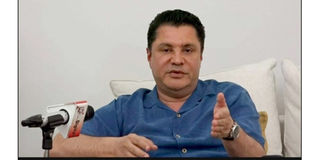Rostam Aziz calls for stronger investment in Tanzania’s media sector

Rostam Aziz
What you need to know:
- Delivering his message through seasoned journalist, Mr Absalom Kibanda, at the ongoing Second African Media Councils Summit in Arusha, Mr Aziz said that such investment is essential in tackling the growing threat of disinformation by delivering truth with creativity, integrity and a uniquely Tanzanian perspective
Arusha. Prominent businessman, Rostam Aziz, has urged the private sector, journalists and civil society to significantly scale up investment in Tanzania’s media industry, with a particular focus on building modern and competitive digital platforms.
Delivering his message through seasoned journalist, Mr Absalom Kibanda, at the ongoing Second African Media Councils Summit in Arusha, Mr Aziz said that such investment is essential in tackling the growing threat of disinformation by delivering truth with creativity, integrity and a uniquely Tanzanian perspective.
“Much of the harmful content dominating narratives about Tanzania does not originate from within,” said Mr Aziz.
“It is created and spread by external actors who are not bound by our laws, culture, or values,” he added.
He emphasised that many of these actors have no interest in the country’s peace or development and are never held accountable for the impact of their messaging.
“This is why we must take bold action to enable Tanzania to own and manage advanced digital platforms that are competitive, innovative and tell our stories with authenticity and dignity,” he said.
Mr Aziz talked of the need to empower the youth, particularly digital journalists, tech innovators, data scientists, and AI experts, to narrate Tanzania’s stories through Tanzanian eyes, in a Tanzanian voice, and anchored in local values.
He said this effort is not only a matter of national security but also a vital issue of intellectual and national sovereignty, which should be safeguarded by those grounded in Tanzanian soil.
The three-day summit, themed Strengthening Media and Communications Regulation as the Foundation of Journalistic Excellence in Africa, is organised by the Network of Independent Media Councils in Africa (NIMCA) in partnership with the Media Council of Tanzania (MCT).
Speaking during the event, NIMCA chairman, Mr Ernest Sungura, said the gathering has drawn participants from more than 19 African media councils and international partners.
Participants would explore strategies for reviving the economic sustainability and editorial independence of media houses, which are under pressure from rapid technological transformation.
“The challenges confronting African media demand a united front. We need a strong collective voice to defend press freedom, uphold ethical standards, and ensure the media continues to inform, educate, entertain, and hold power to account,” said Mr Sungura.
He noted that participants in the meeting would also review how other countries regulate their media and how they ensure journalists and editors adhere to the highest levels of professionalism and ethics.
“We also aim to deepen collaboration in reforming media and communications laws, which we believe form the backbone of journalistic integrity across the continent,” he added.
Unesco’s representative, Mr Tawfik Jelassi, highlighted the growing danger posed by misinformation and deliberate disinformation, which has led to a notable decline in public trust in institutions.
Citing the World Economic Forum’s 2025 Global Risks Report, Mr Jelassi said disinformation has been ranked as the most severe global threat over the next two years.
“The rapid advancement of technologies such as generative Artificial Intelligence (AI) and opaque algorithmic systems has further complicated the media environment. These developments are outpacing existing regulatory frameworks,” said Mr Jelassi.
He said Unesco continues to support regional dialogue and practical solutions to address these challenges, beginning with discussions taking place at the Arusha summit.




